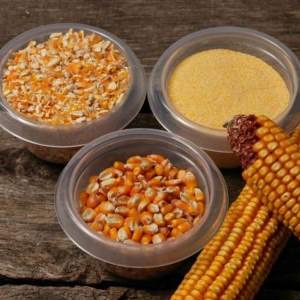
Cereal grains are grasses that are grown for their edible fruits. Corn (
Zea mays), wheat (
Triticum aestivum), millet (
Echinochloa spp.) and rice (
Oryza sativa) are examples of cereal grains.
Corn provides energy for birds. Most birds will eat dried corn in some form: whole-kernel; cracked; corn meal; dried on the cob; and corn bread. Make sure to use yellow corn instead of white corn, since yellow corn has more vitamins. Cracked corn is whole-kernel corn that has been chopped into smaller pieces. Cracked corn spoils faster than whole-kernel corn and may attract species that are not popular at feeders such as European starlings (Sturnus vulgaris) and house sparrows (Passer domesticus). However, cracked corn can be eaten by small birds that cannot swallow a full kernel of corn. Whole-kernel corn, either left on the cob or shelled from the cob, may be eaten by species including the northern bobwhite (Colinus virginianus), mourning dove (Zenaida macroura), red-bellied (Melanerpes carolinus) and other woodpeckers, blue jay (Cyanocitta cristata) and northern cardinal (Cardinalis cardinalis).
Other cereal grains that are used as bird foods include wheat, millet and sorghum (Sorghum spp.). Cracked wheat is included in some purchased birdseed mixes. It may be eaten by several types of birds including the northern bobwhite, blue jay, chickadees, mourning dove, northern cardinal, American goldfinch (Spinus tristis) and pine siskin (Spinus pinus). Millet is a small, spherical seed that is often the main ingredient in purchased birdseed mixes. While it is taken by mourning doves, blackbirds and some sparrows and finches, many birds will not eat it. There are several types of millet, and if you use it at the feeder, you should try some different kinds of millet to see which one may work best with the birds that visit your feeding station. Sorghum is another spherical grain included in commercial birdseed mixes. It is brown and much larger than millet. It contains a little more protein and a little less fat than corn. The mourning dove, blackbirds and some sparrows and finches will eat this grain.
Grains should be a part of the foods offered at a feeder. They are low in proteins and some vitamins, but high in carbohydrates and oils needed for energy. A balanced diet for birds at feeders should include grains, other seeds, nuts, suet and fruit.

